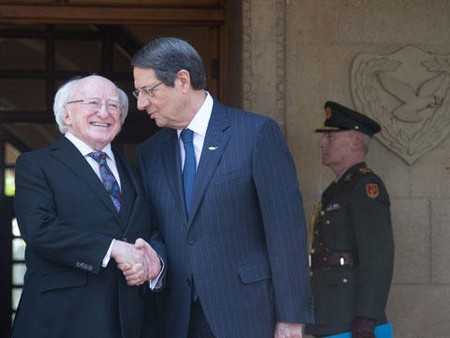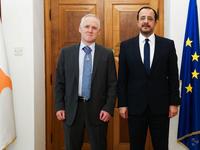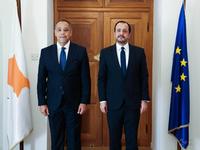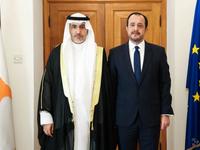Press Releases

14-10-2019 13:34
The President of the Republic met with the President of Ireland
The President of the Republic, Mr Nicos Anastasiades, met today, at the Presidential Palace, with the President of Ireland, Mr Michael Higgins, who is paying a state visit to Cyprus.
President Higgins, accompanied by his wife, Ms Sabena Higgins, arrived this morning at the Presidential Palace, where they were welcomed by President Anastasiades and his wife, Ms Andri Anastasiades.
At the official welcoming ceremony, a military guard payed honors and the National Anthems of the two countries were performed, and later on President Higgins laid a wreath at the statute of Archbishop Makarios III.
Afterwards, the two Presidents held a private meeting followed by expanded talks between the delegations of the two sides.
Later on, President Anastasiades and President Higgins made statements to the Press.
In his statement, President Anastasiades said the following:
“It is a distinct pleasure to welcome my dear friend, the President of Ireland, Mr Michael Higgins, and his delegation to the Presidential Palace and to be offered the opportunity to reciprocate the warm hospitality extended during my state visit to Ireland in 2016.
Your visit Mr President, the first by a President of Ireland to Cyprus since 2006, constitutes another important milestone in the relationship between our two countries.
Although located on the opposite peripheries of Europe, our common struggles and aspiration for independence, freedom and the drive to succeed, as well as our membership in the same European family, have brought us closer together, throughout time.
And of course, we greatly value your country’s invaluable assistance to Cyprus during our EU accession course, with Ireland being at the helm of the Council of the EU on 1st May 2004, welcoming us when we joined the Union.
At the same time, we are particularly grateful to Ireland for the thousands of Irish soldiers and garda (policemen) who have worn the blue beret of UNFICYP, over the last 55 years. We also respectfully honor the memory of 9 Irish officers who lost their lives on the island in the service of peace.
Last, but not least, we are equally thankful of Ireland’s significant contribution to the humanitarian work of the Committee of Missing Persons.
During our fruitful meeting with President Higgins, we did not only reaffirm the excellent co-operation and synergies we have established both bilaterally and multilaterally, but we also exchanged ideas on the need to further strengthen our beneficial partnership, particularly in the fields of trade, investment, tourism, higher education.
We also discussed a wide range of issues of mutual interest and concern, particularly migration, climate change and the future of the European Union.
In this respect, I had the opportunity to inform President Higgins of the initiative undertaken by Cyprus for coordinating regional climate change actions, taking into account particularly alarming projections concerning the impact of climate change on the Eastern Mediterranean and Middle East.
On the issue of migration, we both agree that the management of migratory flows continue to pose one of the most serious challenges that our Union is faced with. This requires long term solutions combining more effective control of the EU’s external borders, increased external action and strengthened internal cooperation.
In addition, it should be taken into account that the Southern European Union Countries are not only at the forefront of migratory external pressures, but they have been experiencing a continuous increase of migratory influx and of asylum applications.
Thus, and while not excluding the possibility of new unprecedented waves of refugees following Turkey’s unacceptable intervention in Syria, we strongly believe that shared responsibility and solidarity with those most affected must underpin the EU’s common migration policy.
In the context of our deliberations, Brexit was, of course, one of the main issues, since both Cyprus and Ireland will be significantly affected by the UK’s exit from the EU.
I have listened with interest to President Higgins on the latest developments and the implications that Brexit will have on Ireland, and I reiterated our unwavering solidarity with Ireland on this sensitive issue.
Cyprus stands firmly in support of the EU commitment to protect the all-island economy of Ireland, as well as the EU Single Market and, most importantly, the Good Friday Agreement and the peace process.
As it was expected, I had the opportunity to inform President Higgins on the latest developments on the Cyprus Problem, as well as regards the latest Illegal and unacceptable actions by Turkey and the intention to conduct exploratory drillings within the internationally recognized and licensed plots within the Exclusive Economic Zone of the Republic of Cyprus.
Actions which constitute by far the most severe escalation of Turkey’s unlawful activities to date, and another blatant violation of the sovereign rights of the Republic of Cyprus and of international law, while they also pose a threat for the broader stability, peace, and security in the already turbulent Eastern Mediterranean.
As I have stressed to President Higgins, our side is determined to exhaust all the diplomatic means at our disposal in order for the Turkish violations to be terminated, in full respect of the unhindered exercise of the sovereign rights of the Republic of Cyprus.
In this regard, we are deeply grateful for the active support of Ireland in condemning Turkey’s actions that test our values of upholding international law and the need to abide with the principle of maintaining and promoting good neighbourly relations.
We do hope that during the EU Summit to take place this week, the EU will collectively communicate a firm and strong message to Turkey.
In this endeavour and during the talks to follow at the Summit, I have no doubt Mr President that we will, yet again, receive your full and unwavering support.
It would be an omission on my behalf, if I did not also extend the genuine appreciation of the Government and the people of Cyprus for the President’s personal interest and strong support to reaching a comprehensive and viable settlement on the Cyprus Problem, in accordance with the relevant UN Security Council Resolutions, international law and the EU acquis.
To this end, Mr President, I wish to assure you that I remain deeply committed to continue my tireless efforts to end the unacceptable status quo and reunite Cyprus.
And the only way to achieve this is not with gun-boat diplomacy, blackmail tactics and attempts to force our side to negotiate under duress, but through an environment of equal standing and an environment conducive to holding constructive discussions.
With these words, I want to thank you once more for your visit which has laid another foundation for even deeper cooperation between our countries for years to come, to the mutual benefit of our peoples.
Dearerst Michael, once again welcome to Cyprus”.
On his part, President Higgins said that “it is an honour and a pleasure for Sabina and me to be with you here today on the occasion of this State visit by a President of Ireland to Cyprus, a visit which returns the visit by President Anastasiades and Ms Anastasiades to Ireland in 2016, which is very fondly remembered by those of us in Ireland.
At a personal level, for some time I had hoped for the opportunity of visiting this wonderful country of which I had read so much, and an island which has made a deep and lasting contribution to our great European civilization.
I thank you for the warmth of your reception. Perhaps the fact that Irish people and Cypriots relate to each other so well is that, being island nations, we both place such a high value on hospitality and friendship. This has been so evident since my arrival.
My visit provides an opportunity to reaffirm the strong historic friendship that exists between Ireland and Cyprus, two island member states of the European Union with relatively small populations at diagonal opposites of our diverse continent, but with a range of shared values, experiences and prospects.
It is not only in ancient, but in contemporary times, that we share experiences. Like Ireland, Cyprus in recent times suffered a severe recession during the global financial crisis, and there is a sense that special mutual solidarity that comes from such a shared experience, as we reflect on what we experienced, and how both of our countries have emerged from these economic difficulties.
The departure of the United Kingdom from the European Union has implications for both of our peoples and we have been supportive of each other’s specific national issues.
Given our mutual experience of conflict and peace-building, Ireland has traditionally been sensitive to the challenges Cyprus faces in its ongoing search for a resolution of the Cyprus partition issue. Our sensitivity and solidarity will continue.
Ireland has supported the United Nations peacekeeping mission in Cyprus over many decades. Our record of contribution to UN peace-keeping missions is something of which we are very proud, being continuous, as it has been since the earliest days of our joining of the United Nations.
We understand very well in Ireland how overcoming a legacy of conflict and division is a difficult and time-consuming process, one requiring great patience and dedication but achievable with political will on all sides. The good will of others with an informed understanding in such endeavours is so valuable, and that the role of the United Nations, for example, remains central to the process of conflict resolution, and achieving reconciliation.
Knowing that Cyprus’s tireless efforts in search of a settlement will continue, Ireland will do whatever it can to be of assistance in such endeavours, in the hope for lasting peace and reconciliation on the island of Cyprus.
We will continue to support all of your efforts to reach a resolution that will ensure peace and stability for Cyprus through the establishment of an honourable, balanced and durable settlement.
The Irish and Cypriot peoples are migratory people from seafaring nations. It is no surprise that we are both forging maritime links given our shared naval histories, with your own reaching back to the Classical period.
Tomorrow, I will visit the Committee on Missing Persons in the United Nations Buffer Zone which helps families to recover, identify, and return the remains of their loved ones who went missing during the intercommunal fighting of 1963 to 1964 and the events of 1974. Ireland, which had such a task that continues, is happy to support the Committee’s work.
Culture has always been important to both of our peoples and thus, it is no surprise that a number of cultural events are planned for my visit. Among these, I am very much looking forward to visiting the Ancient Kourion site, and of course also to the performance of poetry and music at the Cyprus Theatre Organisation, in Nicosia tomorrow.
I value the honour it is to have been invited to address the Cypriot House of Representatives on Wednesday, at which I will have the opportunity to speak of the shared bonds between our two countries, as well as the shared challenges we face in tackling the multiple crises of our times – ecological, economic and social.
My visit provides an opportunity to celebrate the developing bilateral links in the marine sector between the two islands, the opportunity it gives to promote Irish culture in Cyprus and to deepen Ireland’s connection with the resident Irish community.
Finally, may I reiterate that we meet today at a time of great challenges.
In that context, it would be remiss not to express my deep concern, as President of Ireland, at which is happening in northern Syria, and the unilateral intervention by Turkey in that area.
The possibility of coercion or forced returns of refugees is an appalling one and totally unacceptable. May I also express, in the strongest terms, how any attempt at demographic change is not acceptable. I urge Turkey to seek an alternative, negotiated approach, one that rejects military intervention and its resulting humanitarian distress.
I also share the concern of Cyprus in relation to the recent arrival of drilling and prospecting offshore. Matters of the maritime and activities at sea should be undertaken under international law and any necessary negotiations undertaken in that context”.
(RM/EK)
Relevant Press Releases







